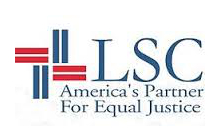Senate Appropriations Committee Votes to Increase LSC Funding for FY 2026
 The U.S. Senate Appropriations Committee included $566 million in funding for the Legal Services Corporation (LSC) today when they approved the Commerce, Justice, Science and Related Agencies (CJS) Fiscal Year 2026 appropriations legislation. This would increase LSC funding by $6 million from the organization’s $560 million appropriation in FY 2025.
The U.S. Senate Appropriations Committee included $566 million in funding for the Legal Services Corporation (LSC) today when they approved the Commerce, Justice, Science and Related Agencies (CJS) Fiscal Year 2026 appropriations legislation. This would increase LSC funding by $6 million from the organization’s $560 million appropriation in FY 2025.
On Tuesday, the House of Representatives Appropriations Subcommittee included $300 million in funding for LSC in their proposed CJS FY 2026 appropriations legislation. This represents a 46% cut from LSC’s FY 2025 funding level. The full committee markup of the House appropriations bill has been postponed and not yet rescheduled.
Both the Senate Appropriations Committee and the House Subcommittee did not follow the White House’s proposal to eliminate LSC in their FY 2026 budget proposal to Congress on May 30, which provided $21 million to close down LSC.
Currently, LSC funding supports nationwide civil legal assistance that benefits over six million Americans annually. Among them are nearly 205,000 domestic violence survivors, over 44,000 veterans, nearly 987,000 children and more than 312,000 older Americans with active legal cases that would go unresolved if LSC was eliminated.
“We appreciate the Senate Appropriations Committee’s ongoing bipartisan support of LSC,” said LSC President Ron Flagg. “This increased appropriation is no small gesture considering the current political environment.”
"The Senate’s increase for LSC demonstrates legislators’ continued understanding that civil legal assistance is critical for our justice system, and it reflects how vital federal investment is for millions of Americans who cannot afford an attorney when facing life-changing legal problems,” Flagg continued. “We look forward to the vote of the full Senate.”
Prior to today’s vote, “Dear Colleague” letters in support of robust funding for LSC were endorsed by 48 bipartisan members of the U.S. Senate and 154 bipartisan members of the U.S. House of Representatives.
External stakeholders also sent letters to Congress supporting strong investment in LSC for FY 2026, including 40 bipartisan state attorneys general, 37 bipartisan chief justices of state supreme courts, leaders of 160 U.S. law firms with offices across all 50 states, and from the general counsels or chief legal officers of 104 of America’s largest corporations.
More than 94% of LSC’s federal appropriation is distributed as grants to 130 independent nonprofit organizations with offices in every Congressional district around the country. These organizations provide direct representation, resources and education to their communities for civil legal matters involving domestic violence, disaster recovery, consumer scams and fraud, housing and more.
LSC’s FY 2026 budget request called for $2.13 billion to fund this work. This funding request, which was unanimously approved by the organization’s bipartisan Board of Directors, is based on the resources needed for LSC-funded legal services providers to fully serve the 3.7 million eligible Americans who seek assistance each year. At LSC’s current funding level, its grantees are forced to turn away or provide only partial help to more than 1.1 million children, 1 million individuals and families facing eviction, 115,000 veterans and 535,000 survivors of domestic violence every year.
Recent analysis of over 50 studies found that civil legal services yield an average return of $7 for every $1 invested. Legal assistance generates a positive economic impact by preventing or solving legal problems that would lead to costly public expenditures on things like emergency medical care, law enforcement and shelters. Legal aid also helps improve family stability, leading to increased participation in local economies and reduced reliance on other forms of assistance.
Visit LSC’s Funding Impact Calculator to find out how federal funding for LSC impacts the number of people that legal services providers are able to assist at the national, state or district level.